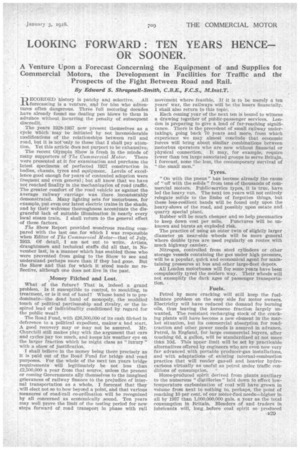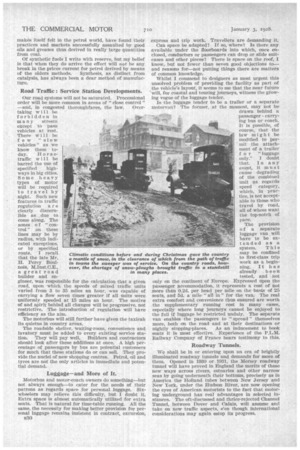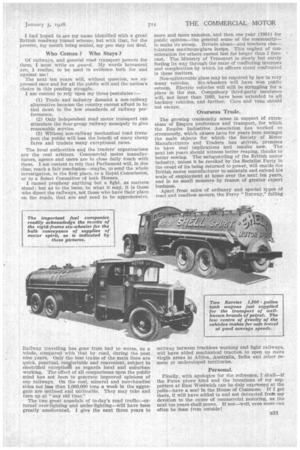LOOKING FORWARD: TEN YEARS HENCE
Page 47

Page 48

Page 49

If you've noticed an error in this article please click here to report it so we can fix it.
OR SOONER.
A Venture Upon a Forecast Concerning the Equipment of and Supplies fot Commercial Motors, the Development in Facilities for Traffic and the Prospects of the Fight Between Road and Rail.
By Edward S. Shrapnell-Smith, C.B.E., F.C.S., M.Inst.T.
RECORDED history is patchy and selective. All forecasting is a venture, ad for him who adventures often dangerous. Three full motoring decades have already found me dealing pen blows to them in advance without incurring the penalty of subsequent discredit,
The years 1928-1937 now present themselves as a cycle which may be initiated by not inconsiderable modifications of the relationships between rail and road, but it is not 'only to these that I shall pay attention. Yet this article does not purport to be exhaustive.
The recent Olympia Show is fresh in the minds of many supporters of The Commercial Motor. There were presented at it for examination and purchase the latest specimens of perfected 1927 construction in bodies, chassis, tyres and equipment. Levels of excellence good enough for years of contented adoption were frequent and even general ; but all know that we have not reached finality in the mechanization of road traffic. The greater comfort of the road vehicle as against the average railway carriage was there incontestably demonstrated. Many lighting sets for motorbuses, for example, put even our latest electric trains in the shade, and by their welcome thoroughness accentuate the disgraceful lack of suitable illumination in nearly every local steam train. I shall return to the general effect of these factors.
The Show Report provided wondrous reading corn-• pared with the last one for which I was responsible when Editor of The Commercial Motor—that of July, 1913. Of detail, I am not out to write. Artists, draughtsmen and technical staffs did all that, in November last, in a manner which has enabled those who were prevented from going to the Show to see and understand perhaps more than if they had gone. But the Show and that for which it stood made me reflective, although one does not live In the past.
,Money Filched and Lost.
What of the future? That is, indeed a grand problem. Is it susceptible to control, to moulding, to treatment, or is it out of hand? Whose hand is to predominate—the dead hand of monopoly, the muddled touch of political partisanship and rivalry, or the inspired lead of individuality conditioned by regard for the public weal?
The Road Fund, with L26,500,000 of its cash filched in deference to a political expedient, makesa bad start. A good recovery may or may not be assured. Mr. Churchill still makes play with the argument that cars and cycles pay too much, and keeps his weather eye on the larger fraction which he might class as " luxury " with a show of justification.
I shall believe in the money being there precisely as it is paid out of the Road Fund for bridge and road purposes. For the whole of the next ten years bridge requirements will legitimately be not less than £2,500,000 a year from that source, unless the present or coming Governments ally themselves to the imagined grievances of railway finance to the prejudice of internal transportation as a whole. I forecast that they will elect not so to how beyond a point, and that various measures of road-rail co-ordination will be recognized by all concerned as economically sound. Ten years may well prove the limit of the testing period for new steps forward of road transport in phase with rail movement where feasible. If it is to be merely a ten years' war, the railways will be the losers financially. I shall also return to this topic.
Each coming year of the next ten is bound to witness a drawing together of public-passenger services. London is preparing to give a lead of far-reaching signalcance. There is the precedent of small railway undertakings, going back 70 years and more, from which experience we may almost conclude that economic forces will bring about similar combinations between motorbus operators who are now without financial or physical connection. It may, for example, require fewer than ten large associated groups to serve Britain. I forecast, none the less, the contemporary survival of " the small men."
Tyres.
"On with the pneus " has become already the cause of "off with the solids" from tens of thousands of commercial motors. Public-service types, it is true, have led the heavy van. The next ten years will not entirely relegate solids to the limbo of forgotten things, but these less-resilient bands will be found only upon the heavy-slows of the road, and possibly upon estate and quarry special plant.
Rubber will be much cheaper and so help pneumatics to keep down cost per mile. Punctures will be unknown and bursts an exploded risk.
The practice of using an outer twin of slightly larger diameter on near-side wheels will be more general where double tyres are used regularly on routes with much highway camber.
Nitrogen, controlled from steel cylinders or other storage vessels containing the gas under high pressure, will be a popular, quick and economical agent for maintaining pressures at bus and other large-fleet depots.
All London motorbuses will for some years have been compulsorily tyred the modern way. Their wheels will not exemplify the dark ages of passenger transportation.
Fuels.
Petrol by more cracking will still keep the fuelbalance problem on the easy side for motor owners. Electricity will have reduced the demand for burning oils, thus leaving the kerosene fraction largely unwanted. The resistant recharging stock of the cracking plants will have become a new element in the market situation, but its commercial absorption for roadtraction and other power needs is assured in advance. Petrol, in England, for large commercial buyers, after touching 6d. a gallon, will be standardized at not more than 10d. This upper limit will be set by practicable alternatives offered by engineers who are even now very far advanced with portable producer-gas installations, and with adaptations of existing internal-combustion practice that will render gas-oil and heavier hydrocarbons virtually as useful as petrol under traffic conditions of consumption.
Home-produced spirit derived from plants auxiliary to the numerous " distilleries" laid down to effect lowtemperature carbonization of coal will have grown in volume from next to nothing to, perhaps, the point of reaching 10 per cent. of our motor-fuel needs—higher in all by 1937 than 1,000,000,000 gals. a year as the total consumption in Britain. Blenders of and traders in lubricants will, long before coal spirit so produced mak& itself felt in the petrol world, have found their practices and markets successfully assaulted by good oiLs and greases thus derived in really large quantities from coal.
Of synthetic fuels I write with reserve, but my belief is that when they do arrive the effect will not be any break in the prices current for petrol derived by means of the olders methods. Synthesis, as distinct from catalysis, has always been a dear method of manufacture.
Road Traffic : Service Station Developments.
Our road systems will not be saturated. Processional order will be more common in areas of "close control" —and, in congested thoroughfares, the law. Overtaking will be forbidden in many streets except to pass vehicles at rest. There will be f e w " slow vehicles" as we know them to
day. Hors etraffic will be barred the use of specified highways in big cities. Some heavy types of motor will be required to travel by night. Such new features in traffic regulation are clearly discernible as due to come along. The zones of "control" on these lines may be by radius, with indicated exceptions, or by specified route. I recall that the late Mr. H. Percy Boulnois, M.Inst.C.E., a great road builder and engineer, was responsible for the calculation that a given road, upon which the speeds of mixed traffic units varied from 3 to 35 miles an hour, was capable of carrying a flow seven times greater if all units were uniformly speeded at 15 miles an hour. The motive of and spirit behind all changes will be progressive, not restrictive. The introduction of regulation will have efficiency as the aim.
The motorbus will still further have given the taxicab its quietus in country areas.
The roadside shelter, waiting-room, convenience and lavatory must be added to every existing service station. They will pay well. Builders and contractors should look after these additions at once. A high percentage of passengers by bus are potential customers for much that these stations do or can sell. They provide the nuclei of new shopping centres. Petrol, oil and tyres are not the only articles in immediate and potential demand.
Luggage—and More of It.
Motorbus and motor-coach owners do something—but not always enough—to cater for the needs of their patrons as regards space for personal luggage. Sixwheelers may relieve this difficulty, but I doubt it. Extra space is almost automatically utilized for extra seats. That is natural for time-table running. All the same, the necessity for making better provision for personal luggage remains insistent in contract, excursion, B30 express and trip work. Travellers are demanding it.
Can space be adapted? If so, where? Is there.any available under the floorboards into which, once enclosed, conductors or passengers can drop or slide suitcases and other pieces? There is space on the roof, I know; but not fewer than seven good objections to— and reasons for—not putting things there are matters of common knowledge.
Whilst I commend to designers as most urgent this unsolved problem of providing the facility as part of .the vehicle's layout, it seems to me that the near future will, for coastal and touring journeys, witness the growing vogue of the luggage tender.
Is the luggage tender to be a trailer or a separate motorvan? The former, at the moment, may not be drawn behind a passenger carrying bus or coach. It is possible, of course, that the law might be modified to permit the attachment of a trailer f o r "luggage only." I doubt that. In any event, it must cause degrading of the combined unit as regards speed category, which, in practice, is not acceptable to those who travel by road, all of whom want the top-notch of pace.
The provision of a separate luggage van will have to be extended as a system. This may be confined to first-class trip work as a beginning. It has already been tested, and not only on the continent of Europe. Expressed upon the passenger accommodation, it represents a cost of not more than 0.2d. per head per mile on the basis of 25 seats, and 5d. a mile "all in" for the van. The real extra comfort and convenience thus ensured are worth the supplementary running cost in many cases, especially where long journeys cannot be enjoyed to the full if luggage be restricted unduly. The separate van enables the passengers to " spread " themselves more, both on the road and at their destinations or nightly stopping-places. As an inducement to book seats it is most effective. Experience of the P.L.M. Railway Company of France bears testimony to this.
Roadway Tunnels.
We shall be in or entering upon an era of brightly illuminated roadway tunnels and demands for more of them. Opened in 1930 or 1931, the Mersey roadway tunnel will have proved in England the merits of these new ways across rivers, estuaries and other narrow seas by going underneath their bottoms, precisely as in America the Holland tubes between New Jersey and New York, under the Hudson River, are now opening the eyes of American motorists to the fact that motoring underground has real advantages in selected instances. The oft-discussed and thrice-rejected Channel Tunnel, between Dover and Calais, will assume and take on new traffic aspects, e'en though international considerations may again estop its progress. I had hoped to see my name identified with a great British roadway tunnel scheme, but with that, for the present, my mouth being sealed, my pen may not deal.
Who Comes ? Who Stays ?
Of railways, and general road transport powers for them, I must "write en guard. My words hereanent are, I realize, to be used in evidence both for and against me
The next ten years will, without question, see expressed once and for all the public will and the nation's choice in this pending struggle.
I am content to rely upon my three postulates :—
(1) Trade and industry demand a non-railway alternative because the country cannot afford to he tied down to the low standards of railway performance.
(2) Only independent road motor transport can stimulate the four-group railway monopoly to give reasonable service.
(3) Without non-railway mechanical road transport the public will lose the benefit of many cheap fares and traders many exceptional rates.
The local authorities and the traders' organizations are the real arbiters. Commercial "motor manufacturers, agents and users are in close daily touch with them. I am content to rely that Parliament will, in due time, reach a fair conclusion—rilaybe, to send the whole investigation, in the first place, to a Royal Commission, or to a Select Committee of both Houses.
I -cannot prophesy anything but a fight, as matters stand ; but as to the issue, be what it may, it is those
• who direct the railways,not those who have their place on the roads, that are and need to be apprehensive.
Railway travelling has gone from bad to worse, as a Whole, compared with that by road, during the past nine years. Only the best trains of the main lines are quick, punctual, congortable and convenient, subject to electrified exception% as regards local and suburban working. The effect of all comparisons upon the public mind has not been to generate improved opinions of Oily railways. On the coal, mineral and merchandise sides not less than 1,000,000 tons a week in the aggregate are untimed and untimable. They may take and turn up at " any old time."
The two great scandals of to-day's road traffic—external over-lighting and under-lighting—will have been greatly ameliorated. I give the next three years to more and more smashes, and then one year (1931) for public opinion—the general sense of the community— to make its swoop. Britain alone—and nowhere else— tolerates maximum-glare lamps. This neglect of consideration for others cannot last for longer than I forecast. The Ministry of Transport is slowly but surely feeling its way through the maze Of conflicting interests and complexities by which its officers stand confronted in these matters.
Non-splinterable'glass may be required by law in very
many vehicles. Six-wheelers will have won public esteem. Electric vehicles will still be struggling for a place in the sun. Compulsory third-party insurance will, not later than 1930, have been extended to all hackney vehicles, and farther. Cars and vans should not escape.
Overseas Trade.
The growing community sense in support of extensions of Empire preference and transport, for which the Empire Industries Association has worked so strenuously, which causes have for years been amongst the main objects for which the Society of Motor Manufacturers and Traders has striven, promises to • have real implications and results now. The next ten years should Witness better reaping, thanks to better sowing. The safeguarding of the British motor industry, unless it be revoked by the Socialist Party in the event of its being returned to power, will enable the British motor manufacturer to maintain and extend his scale of employment at home over the next ten years, and in no small paeasure by reason of greater export business.
Apart from sales of ordinary and special types of road and roadless motors, the Perry " Rutway," falling midway between trackless working and light railways, will have aided mechanical traction to open up more virgin areas in Africa, Australia, India and other remote or undeveloped territories.
Personal.
Finally, with apologies for the reference, I shall—if the Fates prove kind and the intentions of my supporters at East Woolwich can be duly expressed at the polls—have a seat in the House of Commons. If I get there, it will have added to and not detracted froas my devotion to the cause of commercial motoring, as the next ten years shall prove. If not—well, even more can often be done from outside !




































































































